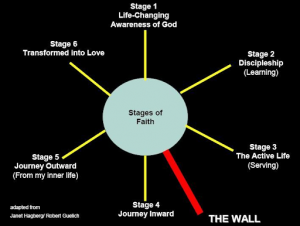A shadow of spiritual doldrums rolled in during the pandemic and seems to have hung around. Headlines crowded with war, suffering, shortages, rising interest and prices…well, it piles on. It’s as if we are in an extended state of Spiritual June Gloom.
Liminal Space
“The gap created by the dissolution of the old and the yet-to-emerge new is what we are calling liminal space. It is a place of disequilibrium. Visually, it can be pictured at the moment when a trapeze performer lets go of one bar and waits in midair to connect with another.”
“…liminality is like hanging in midair until it becomes clear to us what we are to grab. A place where we are caught betwixt and between, liminal space is psychologically and spiritually significant because it is where real transformation can take place.”
The Discerning Heart
The Spiritual In-Between

In my tradition, and perhaps yours, the idea of liminal space was never explained nor even mentioned. However, I believe most people will experience this at some point in their lives.
It often becomes evident when a new phase of life begins: graduations, marriage, children, death of a loved one, career or vocational changes, etc. For me, it has been the convergence of multiple events occurring at the same time: an empty nest, a relationship with a spiritual director, and an unanticipated home improvement project. It has been quite the adjustment moving into this new phase.
If you are familiar with Bobby Clinton’s work and the Leadership Timeline, one of his theories is that few leaders finish well. And I think I understand that now better than ever. Stuff happens!
There Are Stages of Faith
Based on my limited understanding of Spiritual Direction and my 30+ years experience in coaching, the primary difference between coaching and spiritual direction is that spiritual direction seeks to help the directee discover new insights about God, about themselves (the directee), and situations for which the directee is seeking guidance.
Coaching is about discerning those insights through the Holy Spirit and taking action or embracing a new mindset.
Functionally, the two disciplines bleed into each other, but the primary distinguishing factor of coaching is to help leaders take action.
What is the first step in coaching someone in their spiritual formation?
If you are using a coach approach with someone in their spiritual formation, it is helpful to have a framework that illustrates the different phases of development. Many, many people teach and write on this topic, but an excellent read on the phases of development is The Critical Journey: Stages in the Life of Faith by Janet O. Hagberg and Robert A. Guelich. This framework delves into the intricacies of each phase and provides helpful insights around the challenges and strengths of development.
6 Stages of Development in Spiritual Formation
Different authors might use different terms, but the concepts are the same. Here are the six stages of faith:

Most Christians are familiar with Stage 2, Discipleship (Learning) and Stage 3, The Active Life (Serving). However, there are four more stages of development!
What separates stage 3 from 4 is “THE WALL”. THE WALL is where the disequilibrium of liminal space is most pronounced. This is one place where a coach (or spiritual director) can be most helpful.
7 Tips to Coach People in their Spiritual Formation
- Be settled in your own soul
- Create a quiet, uncluttered environment
- Adopt a non-judgemental attitude
- Take on a posture of indifference
- Be compassionate
- Use listening and silence as an opportunity to allow the other person to process
- Ask powerful questions to help the other person reflect deeply
These 7 tips can be applied to coaching in general. Speaking from personal experience, I believe this to be even more critical in coaching for spiritual formation.
Are you hitting THE WALL?
As I reflect on my own journey, it has been life-giving to have a spiritual director during this season. In reality, I do not believe I could have navigated this season well without his help. Without another person to help me process and reflect on the work of God in my life, I would have floundered. One insight he has shared with me is that very few make it through THE WALL. Clinton’s research supports this idea and speculates that only about 30% finish well!
Finishing Spiritually Well
Here are some closing thoughts from Clinton to encourage you and those you coach to finish well!
- Maintain a personal vibrant relationship with God right up to the end.
- Maintain a learning posture and learn from various kinds of sources—life especially.
- Manifest Christ-likeness in character as evidenced by the fruit of the Spirit in your life.
- Live out Truth in your life so that the convictions and promises of God are seen to be authentic.
- Leave behind one or more ultimate contributions.
- Walk with a growing awareness of a sense of destiny and see some–or all–of it fulfilled.
May it be said of you and those you coach through their spiritual formation.
Resources
Are you looking to take your coaching to the next level?
“The Christian Coaching Excellence Track was exactly what I needed. The 360° assessment combined with the group meetings and the one-on-one mentoring helped me to identify precisely where I needed to grow and how to improve my own coaching. I can already see a boost in my sessions with my clients.” —John Fooshee, President of People Launching
The Coaching Excellence GrowthTrack combines the best in coach training resources with wisdom from ICF Certified Master Coach, Dr. Gary Reinecke and Coaching Pioneer, Dr. Bob Logan.
- Assess for your strengths and areas for improvement
- Create a custom action plan for your development as a coach
- Implement proven strategies for lasting change
- Connect with a coach-mentor and peer coaches
Register today and receive 10% off! LEARN MORE HERE.
